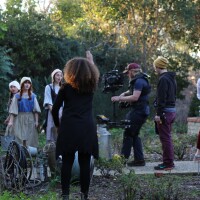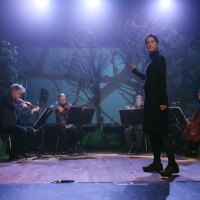Vireo: Q&A with Tenor Ryan Glover
Vireo, the groundbreaking made-for-TV opera, is now available for streaming. Watch the 12 full episodes and dive into the world of Vireo through librettos, essays and production notes. Find more bonus content on KCET.org and LinkTV.org.
Tenor Ryan Glover is an accomplished operatic singer, performing with the Phoenix Opera since his professional debut in 2010, as well as many other productions across the country. He plays the role of Raphael in "Vireo," an assistant to The Doctor (baritone Gregory Purnhagen). As The Doctor grows continuously obsessed with Vireo's (soprano Rowen Sabala) visions and hysteria, Raphael becomes more enamored with Vireo, ultimately professing his undying love, then expressing it by publishing his long thesis on her disorder.
We spoke with Glover about his experience during the production, and what he looks forward to when all 12 episodes are released on KCET in May.

What was the process like for getting the role of Raphael in "Vireo"?
I first heard about the audition through my vocal coach. So, I contacted John Spiak and scheduled an audition in Santa Ana. I booked my flight and started working on the excerpt from Episode 2 that was provided. The day of the audition I flew to Santa Ana and found my way to the Grand Central Art Center. I walked into the theater where they were holding the audition, handed my paperwork to Lisa [Bielawa], and sang "Maria" from "West Side Story." Then I performed the excerpt from Episode 2. Lisa asked me to try a few different ways of singing it. After the other tenors auditioning sang, Lisa pulled in three of us to sing it together. We stayed a little later to meet Charlie [Otte] and Rowen [Sabala]. A few days later Lisa called me personally and offered me the role. I still cite this as the best audition experience of my life.
How would you describe your character, Raphael? What motivates him, and how is that reflected in the music you are singing?
Raphael is a graduate student. He is curious about the world around him and very interested in Vireo. He is also eager to learn from The Doctor. In terms of motivation, Raphael is looking for his big break. Studying hysteria is the hot ticket and he intends to write a thesis about it. In another respect, he is motivated by his affection for Vireo. I believe he loves what she represents, not necessarily her as an actual person. To put it mildly, Raphael is over-the-top. This is apparent musically from the initial entrance in Episode 2, "In the name of God tell us what has afflicted you. By all that is, say who!" This is repeated with several recurring highs, as on the word "who." In later episodes, his music borders on the ridiculous. A highlight is the aria in Episode 6. Lisa kept telling me, "It's the most Broadway moment in the whole score." And it is definitely that! In many ways, I feel like Raphael provides comic relief with his musical outbursts, although I tried to make them as sincere as possible.
You have a lot of experience performing opera in a traditional setting, with the Phoenix Opera and many other productions. Can you talk about how performing in "Vireo," a made-for-broadcast opera, was different than more traditional productions? Was there anything you personally had to adjust?
Several facets of "Vireo" were different than my experience with traditional productions. First, there is no front stage when you are filming. It took a little while to adjust to the idea that I could face any direction and still be seen and heard. Second, spacing on set for this was very different. I could be much closer to my colleagues and there was no need for a raked stage. In traditional productions, you have to purchase your own copy of the score, acquire recordings, pay for coaching, translate and study the language, among many other tasks. For "Vireo," Lisa would send us full scores, piano-vocal scores and practice tracks. In addition to these, she would schedule music rehearsals in a city as near to each participant as possible. She would coach us on the music and help us understand why she composed something the way she did. It was a highly illuminating process. After that, Charlie would help us understand the story of each episode as we staged it. In traditional productions, you stage the whole opera in a few weeks, have several performances, and then you are on to the next production. With "Vireo" the story unfolded slowly and sometimes out of order over a two-year filming process. So, I had to adjust my character arc based on which episode we happened to be preparing or shooting. That was quite a change from playing a character once through during the course of a single evening.
What was it like working with director Charles Otte? What kind of directions did he give you throughout the production?
Working with Charlie was always an adventure. As we started each episode I did not always have a clear idea of how the libretto could be realized and turned into a visually compelling story. However, Charlie had a vision and succeeded in conveying it in succinct language. One of my favorite memories of working with Charlie occurred in August 2016. I was unable to attend a staging rehearsal in Los Angeles. So Charlie stopped by my house in Mesa, Arizona for a few hours and we staged my aria. It was memorable for me because he asked me to do something each time I heard Vireo's voice prior to the start of my aria. As he was walking around me with his hands formed into the shape of a camera I would look up and make a ridiculous excited face and he laughed every time I would do it. Needless to say, I kept it for the shoot a few weeks later. Since the process extended over two years I do not recall a lot of individual directions he gave, but I will always remember the way he made me feel as we created this beautiful work. Charlie has a way of giving you an overarching idea for a scene and then allowing you the freedom to discover what works and what does not. It is a very empowering gift that I have encountered with only a handful of directors.
In what ways, if any, has being involved in "Vireo" changed your outlook on the opera scene and the possibilities for your career?
Being involved in "Vireo" has shown me that anything is possible. Observing Lisa, Erik [Ehn], Charlie and John, among many others, bring this magnificent work to life has been such an inspiring process. Opera is not confined to the opera house. Opera can be produced about wide-ranging subjects. "Vireo" has shown me that opera can be a real voice for change and new insight, giving a voice to the voiceless. It has also shown me that I am capable of accomplishing so much. It has broadened my vision of what a career can look like. I want to work on new operas, musicals, films and multidisciplinary projects. One of the most inspiring moments of the entire experience occurred when we took a break from rehearsing at the Grand Central Art Center and got lunch together. Lisa and Charlie were telling us about the early days of their careers. Each told of the moment that changed everything and put them on their current trajectory. I remember commenting to Maria [Lazarova] (Vireo's Mother) that I looked forward to the time in 20 years when I could tell everyone that Lisa gave me my first big break by casting me in "Vireo."
Over the course of "Vireo's" 12 episodes, the cast is accompanied by a wide range of different ensembles and instruments: the Kronos String Quartet in Episodes 1 and 2, instruments invented by Harry Partch in Episode 7, an entire orchestra in Episode 11. What was it like singing with all of these different ensembles?
It was incredible. Meeting and working with so many amazing musicians was a constant source of creative energy and inspiration. Being able to sing delicately in one episode accompanied by a quartet (one time of strings, the next of saxophones) and then being able to sing with a more robust sound in the next episode accompanied by full orchestra allowed me to exercise the full gamut of my vocal and emotional range. It also showed me the beauty of varying instrumental combinations. Hearing Lisa's orchestrations was a choice experience. Thankfully Lisa kept Raphael firmly grounded with tonal music. Episode 7 was quite the adventure and it was truly thrilling to see Rowen and Emma adjust to the microtones of the Partch instruments.
Which episode or scene are you most looking forward to watching when all 12 episodes are released by KCET this May?
Mostly, I think I am excited to see the full work in one sitting. There are moments that I am eager to see, especially my grand entrance in Episode 7 or the climactic scene in Episode 11. Overall though I want to enjoy the full opera, all 12 episodes, from beginning to end in one sitting. And I would be lying if I neglected to mention that I cannot wait to see the final cut of my aria in Episode 6.


